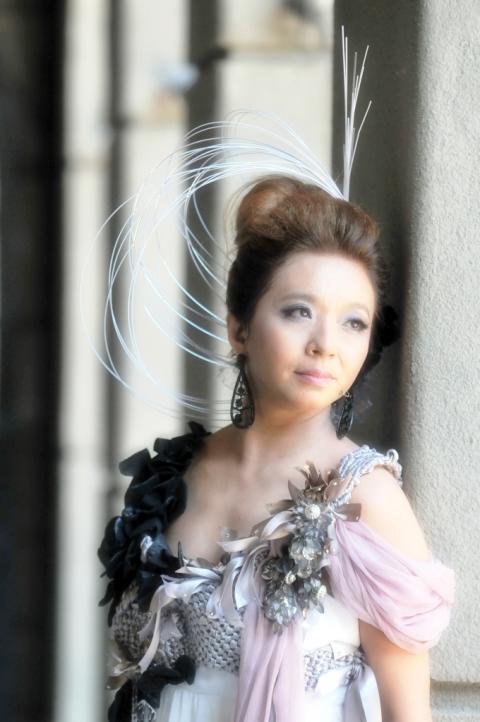The height of artistic brilliance is often accompanied by the saddest of lives when the curtain falls.
“Like Mozart and Schubert, Lee Tai-hsiang’s (李泰祥) life has been marked with such beauty and sadness,” Mel Yang (楊忠衡), producer and playwright of The Dreamy Fallacy, said at a rehearsal on Saturday last week.
The debut production by Taoyuan-based Quanta Theater (廣藝劇場) will be performed at Zhongshan Hall’s Zhongzheng Auditorium (中山堂中正廳) in Taipei starting tonight. The musical weaves together 29 Taiwanese poems and 29 classic songs by composer Lee, recounting a story about the pursuit of love and dreams. Directed by Wu Jin-tao (伍錦濤), the production stars pop songstress Christine Hsu (許景淳), theater veteran Hung Jui-hsiang (洪瑞襄) and musical actor Yeh Wen-hao (葉文豪).

Photo Courtesy of Quanta Arts Foundation
Born in Taitung, Lee spent the early 1970s serving as conductor of the National Taiwan Symphony Orchestra and composing opera and chamber music. He later ventured into popular music and became a legend in the late 1970s folk song era, penning a long string of pop classics including The Olive Tree (橄欖樹), Smiling Face (歡顏) and Farewell (告別). Lee’s poetic, celestially elegant songs evoke an era when love was more innocent and idealistic. In 1987, Lee also composed and produced Chess (棋王), Taiwan’s first large-scale musical.
The Aboriginal maestro has suffered from Parkinson’s disease for more than 20 years.
“I used Lee’s songs to interpret his life and then vice versa. It’s remarkable how frequent his earlier songs would predict his later life events,” Yang said. “But ultimately, this musical is not his biography. I decided to convey the essences of his life only and make it a tale of the life of a musician.”
Pop songstress Christine Hsu (許景淳), who is a protege of Lee, plays the leading female role in the production. She performs five songs including the opening song, The Olive Tree, and the finale, You Are All My Memories (你是我所有的回憶).
“This production has very little dialogue and probably the highest density of songs a musical can have,” director Wu said. “The plot is unrealistic and abstract. We want audiences to find their own memories in the songs.”

In the March 9 edition of the Taipei Times a piece by Ninon Godefroy ran with the headine “The quiet, gentle rhythm of Taiwan.” It started with the line “Taiwan is a small, humble place. There is no Eiffel Tower, no pyramids — no singular attraction that draws the world’s attention.” I laughed out loud at that. This was out of no disrespect for the author or the piece, which made some interesting analogies and good points about how both Din Tai Fung’s and Taiwan Semiconductor Manufacturing Co’s (TSMC, 台積電) meticulous attention to detail and quality are not quite up to

April 21 to April 27 Hsieh Er’s (謝娥) political fortunes were rising fast after she got out of jail and joined the Chinese Nationalist Party (KMT) in December 1945. Not only did she hold key positions in various committees, she was elected the only woman on the Taipei City Council and headed to Nanjing in 1946 as the sole Taiwanese female representative to the National Constituent Assembly. With the support of first lady Soong May-ling (宋美齡), she started the Taipei Women’s Association and Taiwan Provincial Women’s Association, where she

Chinese Nationalist Party (KMT) Chairman Eric Chu (朱立倫) hatched a bold plan to charge forward and seize the initiative when he held a protest in front of the Taipei City Prosecutors’ Office. Though risky, because illegal, its success would help tackle at least six problems facing both himself and the KMT. What he did not see coming was Taipei Mayor Chiang Wan-an (將萬安) tripping him up out of the gate. In spite of Chu being the most consequential and successful KMT chairman since the early 2010s — arguably saving the party from financial ruin and restoring its electoral viability —

It is one of the more remarkable facts of Taiwan history that it was never occupied or claimed by any of the numerous kingdoms of southern China — Han or otherwise — that lay just across the water from it. None of their brilliant ministers ever discovered that Taiwan was a “core interest” of the state whose annexation was “inevitable.” As Paul Kua notes in an excellent monograph laying out how the Portuguese gave Taiwan the name “Formosa,” the first Europeans to express an interest in occupying Taiwan were the Spanish. Tonio Andrade in his seminal work, How Taiwan Became Chinese,